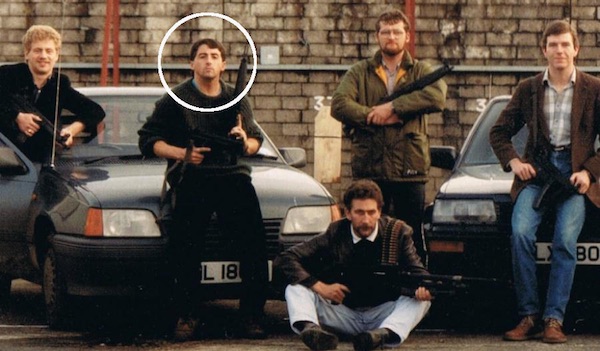
A recently released document marked ‘restricted’ has provided a new perspective on the British government’s collusion with loyalist paramilitaries in the north of Ireland.
The document consists of testimony given by Ian Hurst (pictured, circled), an operative of the British Army’s covert military intelligence squad known as the Force Research Unit (FRU), who went by the cover name Martin Ingram.
It has long been known that the FRU colluded with the loyalist paramilitaries and infiltrated republican groups to murder nationalist activists as part of a covert British military strategy.
Hurst’s testimony, which was given in closed session before the official Bloody Sunday Inquiry, shows that the deadly covert infrastructure run by the British through the FRU continued to exist long after it was supposed to have ended, and may never have truly shut down.
Hurst explains that the British Army had pretended to disband the FRU due to negative publicity and mounting questions about its role in the conflict, only to continue running the same types of covert operations under a new name.
He said: “The FRU was disbanded in name only - primarily because of the bad press that was received via [loyalist double-agent] Brian Nelson but the following day was reformed under a different name but exactly the same structure and take it from me the unit that is in operation within Ebrington Barracks with responsibility for agent handling still has custody of those documents and they are absolutely priceless.”
In his secret testimony, Hurst also provided details on the extent of British military intelligence’s penetration of the IRA and Irish police. According to Hurst’s restricted testimony, over a quarter of Provisional IRA members were British government agents, and MI5 also had a wide network of agents within the 26 County Gardai police.
A month ago, families of 200 people murdered in the conflict accused the British government of continuing to censor files that could throw light on the circumstances of their deaths. Their efforts have so far been refused under the new British Prime Minister Theresa May.
This week, her new governor in Ireland, James Brokenshire, met some families of victims of British state killings. Among those he met was Tony Brown, whose nephew, Paul Whitters, was 15 years old when he was shot in the head with a plastic bullet.
Brokenshire said: “Do I want to see people brought to justice as a consequence of information - I absolutely do” but added his his approach was about “getting this right in ensuring national security”.
Sinn Fein Deputy First Minister Martin McGuinness called for the new Tory regime to permit long-sought legacy inquests to go ahead.
“James Brokenshire has said it is important to instil confidence in all victims,” he said. “He can do that by changing the policy of his predecessor and putting the needs of grieving families ahead of bogus national security concerns by immediately approving the Lord Chief Justice’s request for funding to enable him to fast-track some 56 inquests involving up to 100 deaths.”
![[Irish Republican News]](https://republican-news.org/graphics/title_gifs/rn.gif)
![[Irish Republican News]](https://republican-news.org/graphics/title_gifs/harp.gif)

